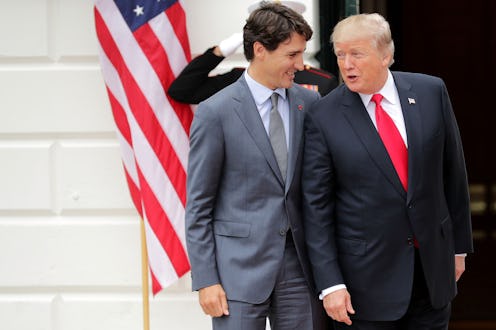News
Trump Pushed Made-Up Facts About Trade & Then Bragged About It To Donors

It's no secret that Donald Trump has a reputation for exaggerating the truth or making outright false claims. The only thing that's changed, it seems, is that now Trump is willing admit and even brag about making up information. At a fundraising event in St. Louis, Missouri, at Boeing headquarters, Trump recalled meeting with Justin Trudeau and making up a trade claim. He insisted to Trudeau that the United States runs a trade deficit with Canada, when in reality he had no idea if that was true.
The Washington Post, which obtained an audio recording, reported what Trump supposedly said:
Trudeau came to see me. He's a good guy, Justin. He said, "No, no, we have no trade deficit with you, we have none. Donald, please." Nice guy, good-looking guy, comes in — "Donald, we have no trade deficit." ... So, he's proud. I said, "Wrong, Justin, you do." I didn't even know. ... I had no idea. I just said, "You're wrong." You know why? Because we're so stupid. ... And I thought they were smart. I said, "You're wrong, Justin." He said, "Nope, we have no trade deficit." I said, "Well, in that case, I feel differently," I said, "but I don't believe it."
Trump said he then sent someone to fact-check his claim, but didn't specify who. The president took a gamble, but he was supposedly proven correct. Trump presented the response of the fact-checker:
Well, sir, you're actually right. We have no deficit, but that doesn't include energy and timber. ... And when you do, we lose $17 billion a year.
"It's incredible," he added.
Trump told the same story in December 2017 at a pro-Trump rally in Florida; on both occasions, he did not mention where this data comes from. The United States actually has a trade surplus with Canada, according to the Office of the United States Trade Representative.
Trump appeared at the St. Louis event to discuss tax cuts and economic policy with top Boeing executives; the event also doubled as a fundraiser for Republican Senate candidate Josh Hawley. In a 30-minute speech to donors, Trump attacked major U.S. allies and trade partners for supposedly taking advantage of the United States and its workforce. He also criticized institutions such as the World Trade Organization and the North American Free Trade Agreement (NAFTA) for for enabling an imbalanced relationship that gave the United States the short end of the stick.
"Our allies care about themselves," Trump said. "They don't care about us."
One of the countries he singled out was South Korea, arguing that while South Korea has gotten rich, the United States is losing out.
We have a very big trade deficit with them, and we protect them. We lose money on trade, and we lose money on the military. We have right now 32,000 soldiers on the border between North and South Korea. Let's see what happens.
One person who may not agree with Trump's trade policies is Larry Kudlow, Trump's pick for director of the White House National Economic Council.
Trump's previous economic adviser Gary Cohn resigned, reportedly because he disagreed with Trump's decision to impose steep tariffs on aluminum and steel. Kudlow, a conservative commentator, may support Trump on tax cuts, but when it comes to foreign affairs he said of Trump: "He's never been good on trade."
CBC News journalist Evan Dyer reports that one of Trump's fact-checkers could've counted goods that pass through Canada but originate from elsewhere.
For example, a Chinese washing machine that passes through the port of Vancouver on its way to the United States is being counted in both the U.S. trade deficit with China and in the U.S. goods deficit with Canada.
Either way, as Trump sets out to enact protectionist trade policies and make up dubious claims to foreign leaders, U.S. allies may have a tough time negotiating.